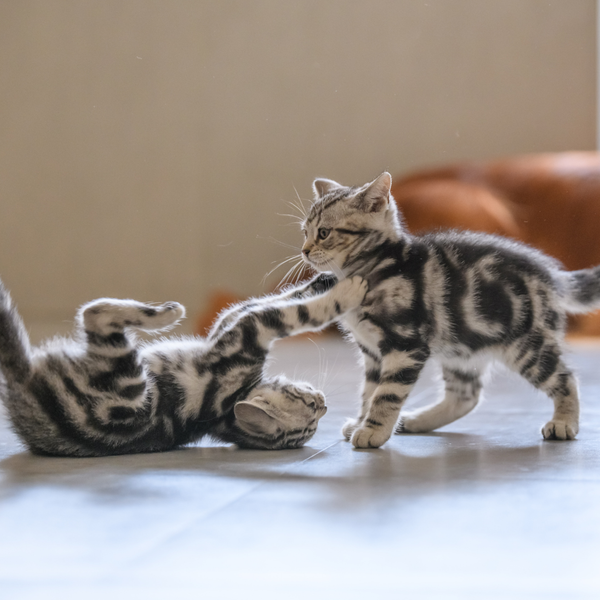
Socializing Your Kitten! Behaviors to Reinforce or Correct
(Dr. Iulia Mihai, DVM) You just brought home a kitten and want them to be fully socialized when they are older? Then you should get down to business immediately!
For a cat to be socialized and friendly as an adult, you must start reinforcing or correcting their behavior from a young age. In other words, kitten socialization is an essential process for their healthy development and for them to become friendly and well-adjusted adult cats. This socialization involves exposing the kitten to various experiences, people, pets, and environments in a positive and controlled way.
Here are some important steps and tips that will help you effectively socialize your kitten:
- Early Socialization
It is essential to start socializing your kitten as soon as possible. The best time to socialize your kitten is between 3 and 7 weeks of age when they are still nursing from their mother. During this time, kittens are curious to explore the world around them and are more receptive to new experiences. They will also learn more quickly during this time. If your kitten was over 7 weeks old when you bought or adopted them, that is no problem. Start now because it is never too late. However, remember that kittens do best if they are socialized by the age of 9 weeks.
Another important aspect is gentle handling. Handle your kitten gently at any age, but especially when they are small. Do not play aggressively with them from a young age because, in the future, you will wonder why they bite you when they play. Handling will get your kitten used to human touch and reduce stress in future situations.
- Continuous Socialization
Your cat needs to be socialized even after the critical socialization period. This means that as your kitten grows, they need to be continuously exposed to new experiences, reinforcement of positive behaviors, play, and mental stimulation. Just like humans, cats can get bored if they are not socialized. In addition, some pets can even become depressed. So, make sure your cat is being properly socialized on an ongoing basis.
- Exposing Your Kitten to Various Experiences
If you have other pets, introduce them gradually and supervise the encounters to avoid conflicts. Cats tend to be territorial, so if you already have other cats or pets, it is best for the interaction to happen gradually. First, let them sniff an accessory from the other pet (collar, toys, blanket, etc.) to become familiar with their scent. On another day, let them see each other from a distance or sniff each other under the door. And so, day by day, you will start to gradually introduce them to one another and neither will feel threatened by the other. Supervise the initial interactions and reward calm and friendly behavior.
Invite various people to interact with your kitten, both adults and children. Always make sure to maintain a positive and calm atmosphere. Use treats to create positive associations with people.
Environment – Exposing your kitten to a variety of sounds and environments will help them become more confident and less fearful in the future. For example, you can expose your kitten to the sound of the TV, the noise of the vacuum cleaner, fireworks, etc.
- Play and Mental Stimulation
We all know how important play and mental stimulation are for children. The same goes for our pets if we want them to develop harmoniously. You can do this by providing your cat with toys and playing all kinds of games. These can stimulate them both physically and mentally. Interactive toys, such as fishing rods and balls, are excellent for developing your kitten's motor skills but also for strengthening the bond between you two. Reward gentle play with treats or affection.
In addition, creating a mentally stimulating environment by adding climbing spaces, high places, or hiding places, will help your kitten explore and feel safe. Reward curiosity with praise and/or treats.
- Positive Daily Routines
The daily routine mainly involves meals and using the litter box. So, feed your kitten at regular times and use these moments to strengthen your bond.
In addition, learning to use the litter box should be done from a young age. Kittens can quickly learn this habit if they are properly guided. Last but not least, always keep the litter box clean to avoid unpleasant odors, possible diseases, and accidents that can happen outside the litter box. How can you do this? Praise and reward your kitten immediately after they use the litter box correctly.
In addition, use unscented litter because cats do not like strong odors (they have a very sensitive sense of smell).
- Be Patient
As with kids, we have to be patient with our furry babies. Therefore, be patient with their responses, as every cat is different. Do not force any interaction and let them explore the world at their own pace!
Moreover, keep an eye on the stress signals they might give you, such as hiding, hissing, and growling, and adjust accordingly.
How To Correct Unwanted Behaviors?
Screaming, yelling, and throwing objects don’t work for cats. Spraying water on them doesn’t work either! The same goes for hitting your pet! Cats are known for ignoring these kinds of “corrections”! The most you can do if you adopt these “corrections” is to scare your cat and make them afraid of you! Moreover, they might also develop a grudge against you! So, if you do not want to lose your bond with your beloved pet, do not do this! So, how do you correct unwanted behaviors? Here are a few tips:
- Aggressive Play
If your kitten starts to play aggressively (bites, scratches, or plays rough), redirect them to appropriate toys and stop play if they become too excited. Also, you should avoid using hands or feet as toys because they will see them as toys later in life, and you won’t like it when your cat will attack you out of the blue. By correcting this behavior, you will prevent future aggressive behavior towards humans and other pets.
- House Soiling
If your cat accidentally urinates or defecates outside the litter box, there is not much you can do to correct this behavior. All you can do is:
- Make sure the litter box is always clean and accessible – cats are very clean animals and they do not like to use a dirty litter box; they will prefer to urinate or defecate in a clean place, which could be your new carpet or bed if the litter box is dirty.
- Use unscented litter (no scents or perfumes that “mask” odors).
- Make sure you have more litter boxes than cats (for example, if you have 2 cats, the ideal is to have 3 litter boxes).
- Address any health issue or stress factors.
All of these steps will help you maintain a clean-living environment and prevent future behavioral problems.
- Destructive Scratching
Most cats will destroy your furniture or carpets as they like to scratch. They don't do it because they have something against your furniture, but because they need to. Cats scratch for several reasons, such as:
- To remove the exfoliated parts of the nails.
- To stretch better.
- To mark the territory (they have pheromone glands in their paws, interdigital).
- To relieve stress.
- To show their excitement.
You can correct this behavior by trimming their nails regularly and buying scratching pads and posts. Use praises or treats every time your cat uses them. Also, you should get your cat used to nail trimming from a young age if you want to be able to do this on your own when they are adults. You can discourage your cat from scratching furniture by covering items with blankets or other thick materials.
From an ethical perspective, declawing is a very bad option. Declawing is considered mutilation as the last toe bone of each digit is amputated to remove the claw. This surgery can also create other behavioral or health issues down the road.
- Clinginess
In time, some cats can become super clingy or over-dependent, which can become annoying for some pet owners. However, most cats that do this do it due to separation anxiety. You can correct this by encouraging independent play. Providing your cat with engaging toys can also help. Be patient with your kitten as they need time to adjust their behavior.
Iuliana graduated from the University of Agronomical Sciences and Veterinary Medicine in 2012, Romania. She has a Master’s degree in Small Animal and Equines Pathology and a strong affinity for Veterinary Parasitology and Laboratory. In 2013 she started her Ph.D. in epithelial cancer in dogs and cats. She volunteered at the faculty’s clinic in her 3rd year of study, and continued her career in small animal pathology and laboratory. She has one cat and eleven rats. Her interests outside of work include traveling, writing, and crafting.

Post a Comment!